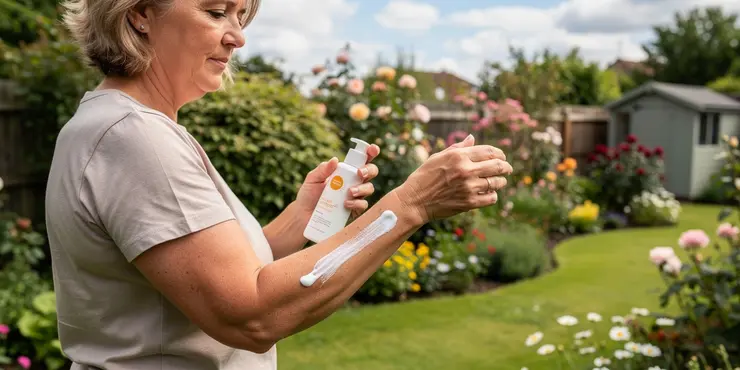
Find Help
More Items From Ergsy search
-
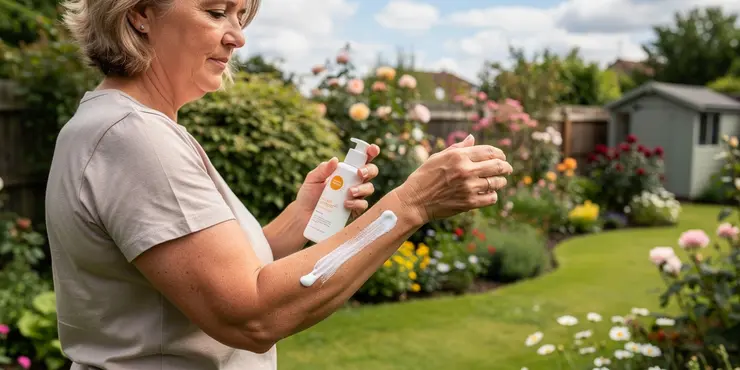
What are the long-term effects of sunburn?
Relevance: 100%
-
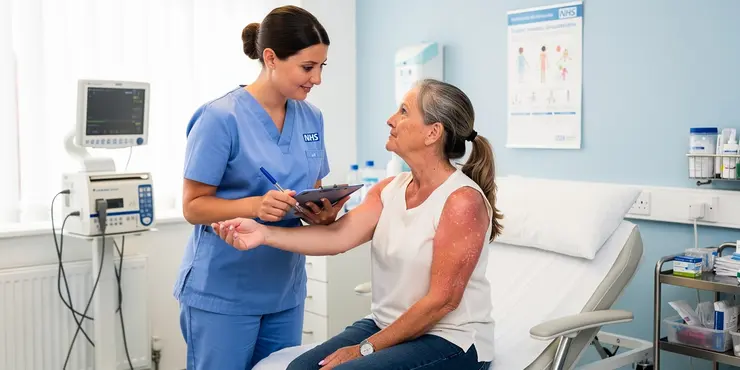
What is Sunburn?
Relevance: 62%
-
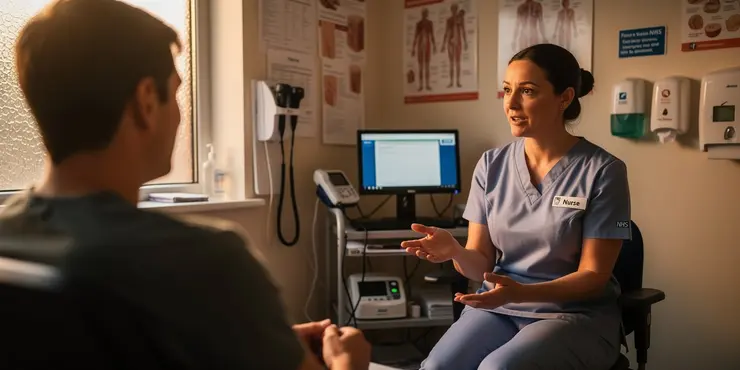
What is sunburn?
Relevance: 60%
-
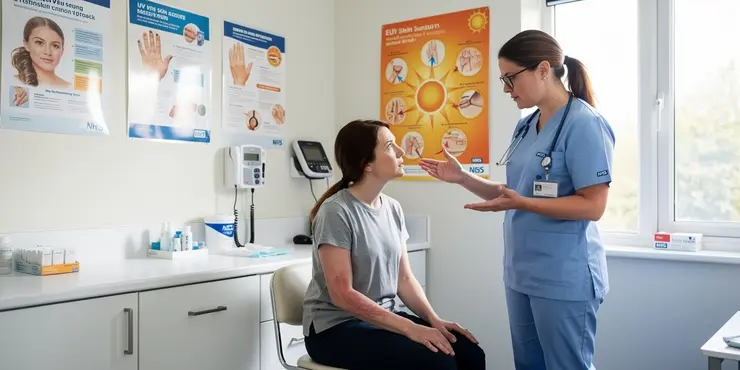
What causes sunburn?
Relevance: 57%
-
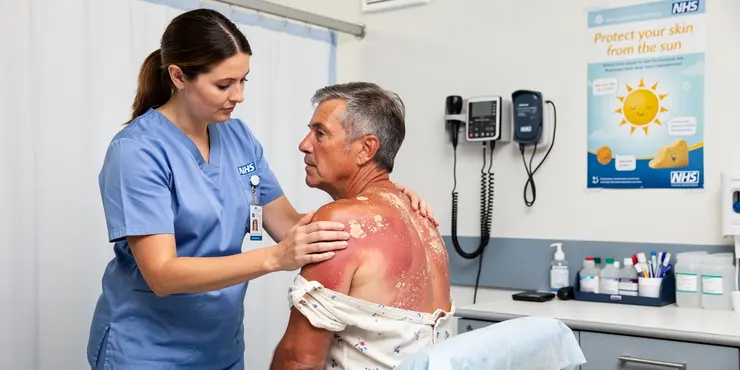
Can sunburn turn into a tan?
Relevance: 57%
-

Self care - sunburn
Relevance: 57%
-

Can sunburns cause permanent damage?
Relevance: 56%
-
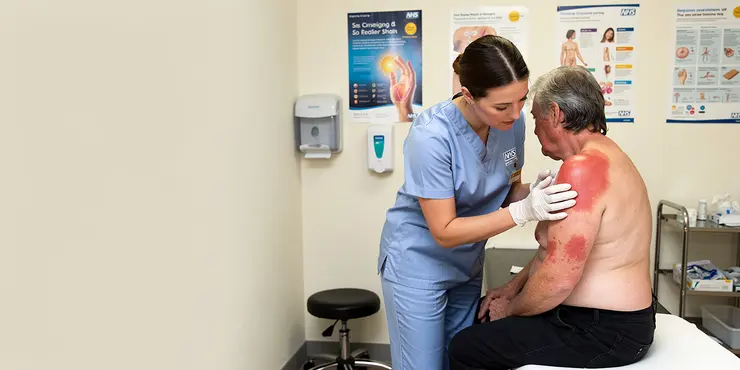
What are the symptoms of sunburn?
Relevance: 55%
-
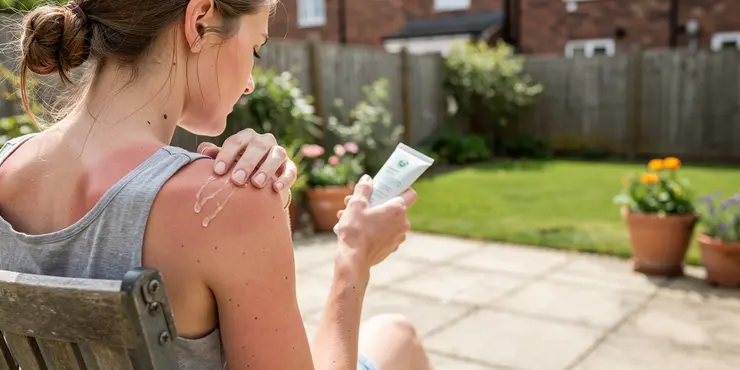
Self care - sunburn
Relevance: 54%
-
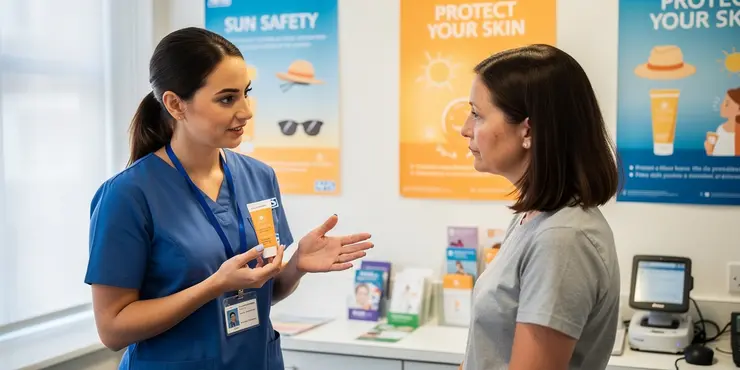
Can sunburn be prevented?
Relevance: 53%
-
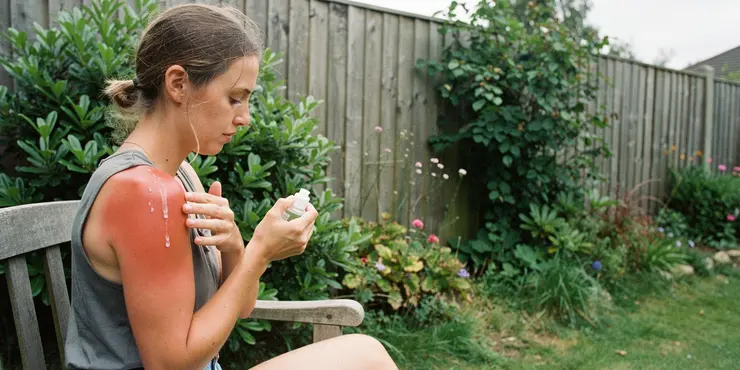
How is sunburn treated?
Relevance: 52%
-

Are there any long-term effects of gonorrhoea?
Relevance: 51%
-
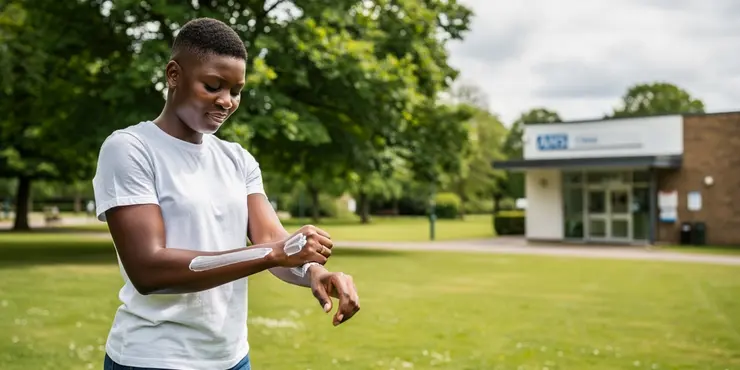
Can dark-skinned individuals get sunburned?
Relevance: 51%
-

Does ketamine have long-term effects?
Relevance: 50%
-

Does tanning lotion prevent sunburn?
Relevance: 50%
-
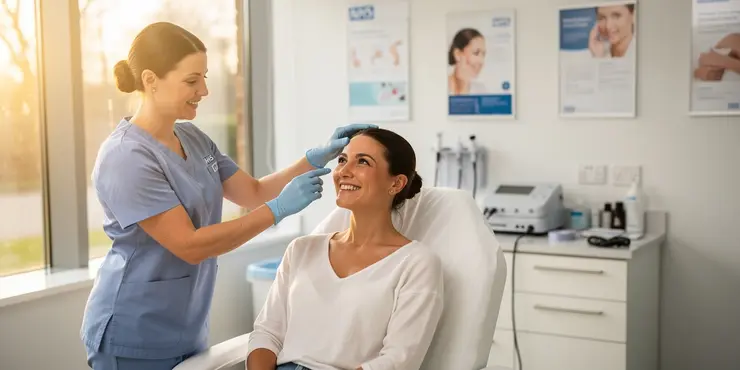
Are there any long-term effects of using Botox?
Relevance: 50%
-
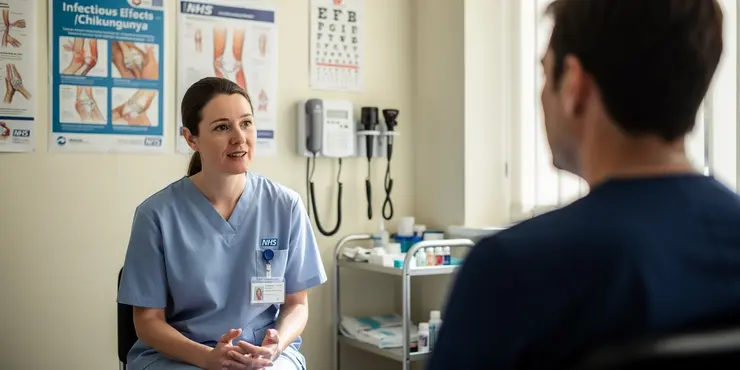
Are there any long-term effects of Chikungunya infection?
Relevance: 50%
-

Are there any long-term effects of using Ozempic?
Relevance: 50%
-
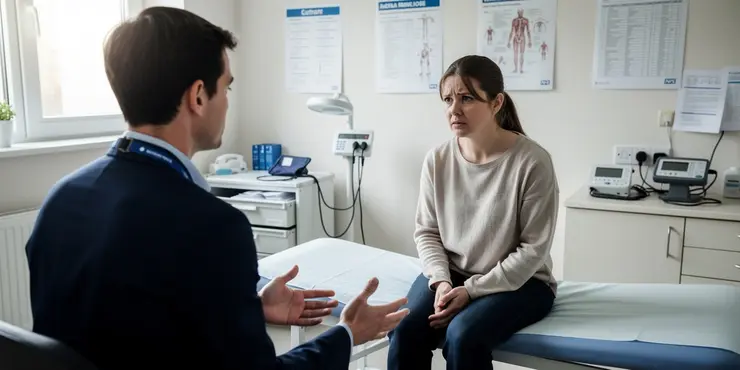
Can whiplash have long-term effects?
Relevance: 50%
-

What are the long-term effects of a heart attack?
Relevance: 49%
-
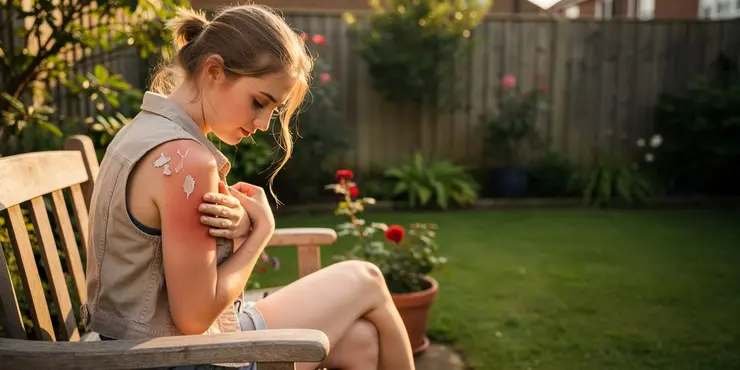
Is peeling a normal part of sunburn recovery?
Relevance: 49%
-
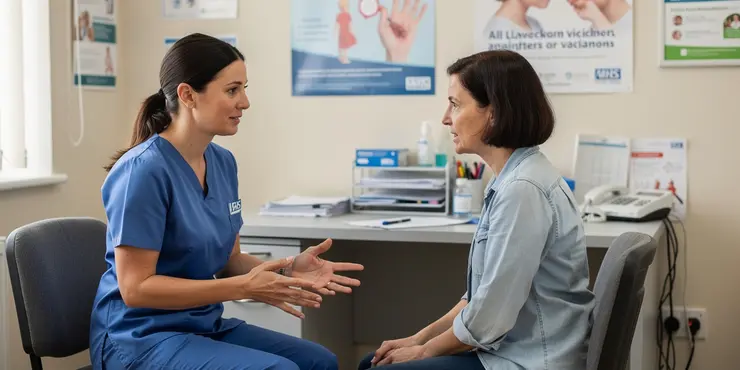
Are there any long-term side effects of the COVID jab?
Relevance: 48%
-
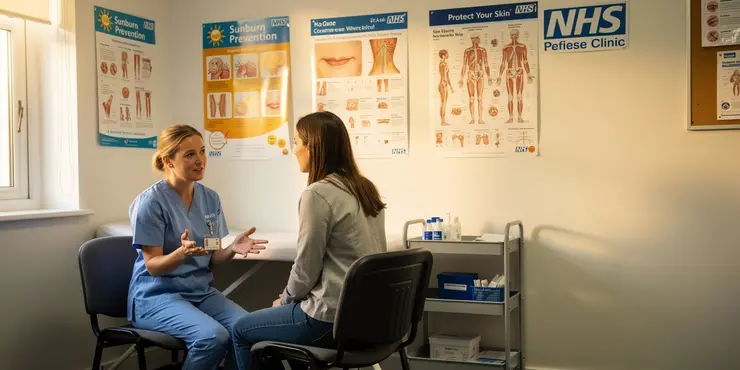
Are some people more prone to sunburn?
Relevance: 48%
-
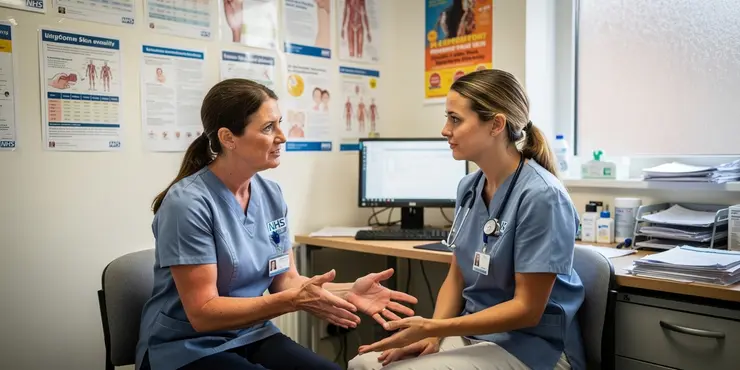
How long does it take for sunburn to appear?
Relevance: 48%
-

Are there any long-term effects of rice food poisoning?
Relevance: 46%
-
What are the long-term effects of untreated eating disorders?
Relevance: 46%
-
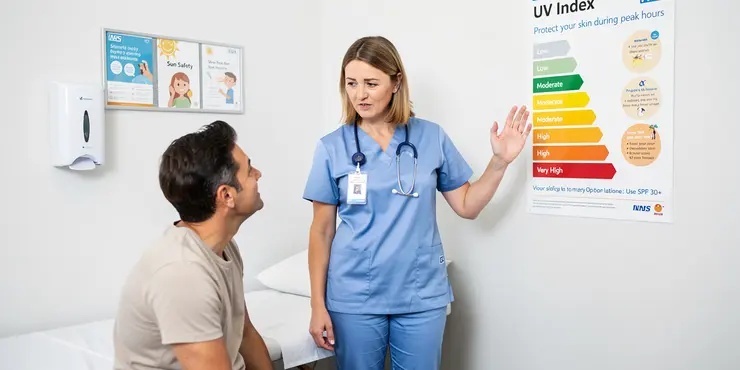
At what time of day is the sunburn risk highest?
Relevance: 46%
-
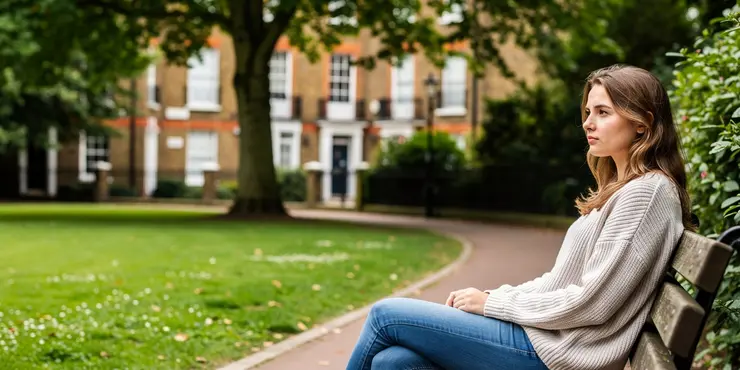
Can drink spiking cause long-term health effects?
Relevance: 45%
-

What are the long-term effects of repeated heatwave exposure?
Relevance: 44%
-
Does tanning on sunbeds reduce the risk of future sunburns?
Relevance: 44%
-

What SPF level is recommended to prevent sunburn?
Relevance: 43%
-
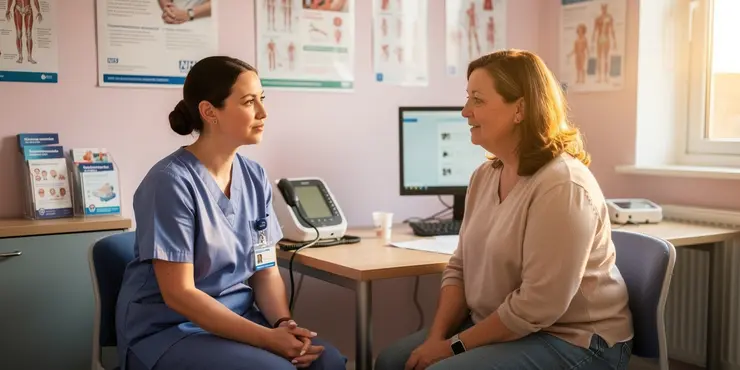
Are there any side effects from long-term use of weight loss jabs?
Relevance: 41%
-
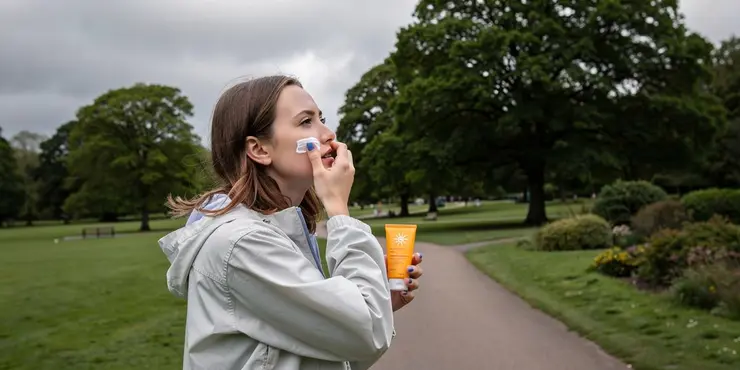
Is it possible to get sunburned on cloudy days?
Relevance: 38%
-

Is it safe to take statins long-term?
Relevance: 35%
-
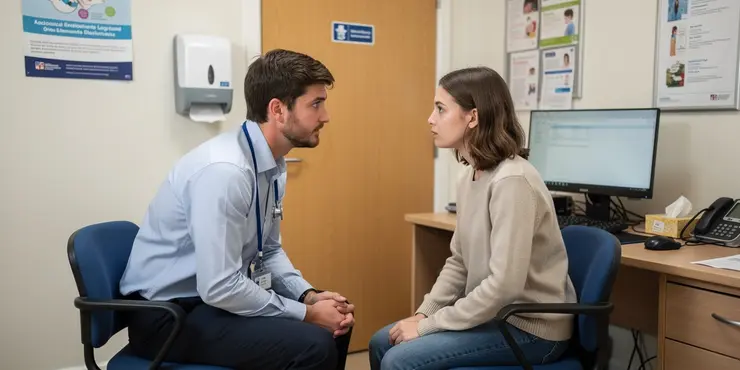
Can meningitis cause long-term complications?
Relevance: 35%
-
Is postnatal depression a long-term condition?
Relevance: 34%
-

Does coffee consumption have any long-term heart health effects?
Relevance: 34%
-
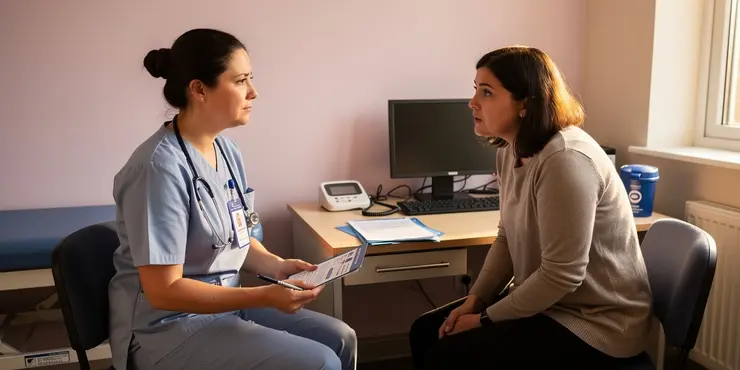
Is it safe to take weight loss jabs long-term?
Relevance: 33%
-

What are some long-term effects of poor sleep quality linked to screen time?
Relevance: 31%
-

Does water reflect UV rays, increasing the risk of sunburn?
Relevance: 30%
Introduction
Sunburn, the skin's acute reaction to excessive ultraviolet (UV) radiation, often from the sun, can result in immediate discomfort and visible damage. However, the long-term effects of sunburn are particularly concerning as they extend beyond temporary pain and redness. Understanding these consequences is crucial for encouraging protective measures against UV exposure.
Skin Aging
One of the most visible long-term effects of repeated sunburns is premature skin aging, also known as photoaging. UV radiation accelerates the breakdown of collagen and elastin fibres in the skin. This leads to the development of wrinkles, loss of skin elasticity, and the appearance of fine lines and leathery texture much earlier than would occur due to natural aging. Brown spots and uneven skin pigmentation are also common outcomes, which contribute to an overall aged appearance long before its time.
Skin Cancer Risk
Exposure to UV rays is a significant risk factor for skin cancer, including melanoma, basal cell carcinoma, and squamous cell carcinoma. Frequent sunburns increase the risk of these cancers, particularly if they occur before the age of 18. Melanoma, the most dangerous form of skin cancer, can develop in areas of skin that have been sunburned and is more aggressive and deadly if not detected early. Regular and intense exposure to UV rays can lead to DNA damage in skin cells, causing them to grow uncontrollably and form malignant tumours.
Damage to Eyes and Immune System
Sunburn's effects are not limited to the skin. UV exposure can also harm the eyes, contributing to cataracts and other eye conditions that impair vision. Moreover, excessive UV radiation can weaken the immune system, reducing the skin's ability to protect itself and increasing the risk of infections. The skin's immunologic function can be compromised, making it more susceptible to allergens and pathogens.
Preventive Measures
Given the severe long-term consequences of sunburn, adopting preventive strategies is essential. Applying a broad-spectrum sunscreen with a high SPF, wearing protective clothing, and seeking shade during peak sun hours can reduce UV exposure significantly. Regular skin checks by a dermatologist are recommended to catch any early signs of skin damage or cancer. Education about sun safety is vital to foster informed choices about sun exposure.
Conclusion
While a sunburn may seem like a temporary nuisance, its long-term effects should not be underestimated. From premature aging to an increased risk of skin cancer, the consequences can be severe and life-altering. By understanding these risks and adopting sun safety practices, individuals can protect their skin and overall health for the future.
Introduction
Sunburn is when your skin gets hurt from too much sun. This hurts right away and can show on your skin. But it's not just about now. Sunburn can cause problems later on too. It's important to know why sunburn is bad and how to protect yourself from the sun.
Skin Aging
Too much sun can make your skin get old faster. This is called photoaging. The sun hurts the stuff in your skin that keeps it firm. This can give you wrinkles and make your skin feel rough. You might see brown spots and uneven color, making you look older too soon.
Skin Cancer Risk
Being in the sun a lot can lead to skin cancer. This includes melanoma, which is very serious. Getting sunburned often, especially when you're young, can increase your risk. Skin cancer happens when the sun harms your skin cells. These cells can change and grow into bad lumps.
Damage to Eyes and Immune System
The sun can also hurt your eyes. This might cause cataracts, which make it hard to see. Too much sun can make it hard for your skin to fight off illness. Your skin might not protect you from germs like it should.
Preventive Measures
It's important to stop sunburn before it starts. Use sunscreen with high SPF to protect your skin. Wear clothes that cover you up and play in the shade if it's too sunny. See a skin doctor to check your skin regularly. Learn how to be safe in the sun to make good choices.
Conclusion
Sunburn may seem like a small problem, but it can cause a lot of harm later. It can make you look older and increase the chance of skin cancer. Knowing these risks can help you stay safe in the sun and keep your skin healthy for a long time.
Frequently Asked Questions
What happens to the skin after repeated sunburns over many years?
Repeated sunburns over many years can lead to premature skin aging, characterized by wrinkles, leathery skin, and age spots. It can also increase the risk of skin cancers, including melanoma.
Can one sunburn cause permanent damage?
While a single sunburn may not cause permanent damage, it can contribute to the cumulative skin damage over time that increases the risk of skin aging and skin cancer.
Is there a connection between sunburn and skin cancer?
Yes, frequent UV exposure and sunburns increase the risk of developing skin cancer, including melanoma, basal cell carcinoma, and squamous cell carcinoma.
Can sunburn affect the DNA in skin cells?
Yes, UV radiation from the sun can damage the DNA in skin cells, potentially leading to mutations that can cause skin cancer.
What are UV rays and how do they affect the skin?
UV (ultraviolet) rays are a type of radiation from the sun. They penetrate the skin and can cause damage to DNA, leading to pre-cancer and aging effects like wrinkles.
How does sunburn lead to skin photoaging?
Sunburn accelerates skin photoaging by damaging collagen fibers and allowing enzymes to break down existing collagen, resulting in wrinkles and loss of skin elasticity.
What are the types of skin cancer linked to sun exposure?
The main types of skin cancer linked to sun exposure include melanoma, basal cell carcinoma, and squamous cell carcinoma.
Are some people more prone to the long-term effects of sunburn?
Yes, individuals with lighter skin, a history of sunburns, or a family history of skin cancer are more prone to long-term effects.
How can sunscreen help prevent the long-term effects of sunburn?
Sunscreen can help prevent sunburn and reduce the risk of long-term skin damage by blocking or absorbing harmful UV rays.
Can sunburn cause changes in skin pigmentation?
Yes, repeated sunburns can cause long-term changes in skin pigmentation, such as age spots and uneven skin tone.
Does sunburn affect the immune system of the skin?
Yes, UV radiation from sunburn can weaken the local immune response of the skin, making it more susceptible to infections and diseases.
What role does sunburn play in the development of melanoma?
Severe, blistering sunburns in early life can significantly increase the risk of developing melanoma later in life.
How does living in different climates affect the risk of long-term sunburn effects?
Living in sunnier climates with higher UV index levels increases the risk of cumulative sun damage and long-term effects like skin cancer.
What are the visible signs of sun damage?
Visible signs of sun damage include wrinkles, age spots, leathery texture, and loss of skin elasticity.
Is there a genetic predisposition to negative effects from sunburn?
Yes, genetics can influence skin type and susceptibility to UV damage, affecting how much sun exposure will cause sunburn or long-term damage.
How can protective clothing minimize sunburn effects?
Wearing protective clothing, such as hats, long sleeves, and UV-blocking fabrics, can shield the skin from harmful UV rays, reducing sunburn risk.
What is the role of antioxidants in combating sun damage?
Antioxidants can help combat skin damage from free radicals produced by UV exposure, potentially reducing long-term damage.
Can using moisturizers help with sunburn long-term effects?
Moisturizers can help maintain skin hydration and barrier function, mitigating some symptoms of dryness and irritation from sun exposure.
Is there a link between sun exposure and cataracts?
Yes, UV radiation can contribute to the development of cataracts, which is why wearing UV-protective sunglasses is recommended.
How important is early intervention in preventing long-term sunburn effects?
Early intervention, including sun protection and regular skin checks, is crucial in preventing and managing long-term effects of sun damage.
What happens to your skin if you get a lot of sunburns over many years?
If your skin gets sunburned a lot, it can get damaged.
The skin might start to look older, like with wrinkles or spots.
You might get a higher chance of skin problems, like skin cancer.
Always use sunscreen and wear hats and long sleeves to protect your skin.
Ask a grown-up to help you use a good sunscreen and reapply it often when you're outside.
Getting sunburned over and over for many years can make your skin look old faster. This can cause wrinkles, rough skin, and dark spots. It can also make it more likely to get skin cancer, like melanoma.
Can getting sunburnt once hurt you forever?
Getting sunburnt once might not hurt your skin forever. But if you get sunburnt a lot, it can make your skin age faster and give you a higher chance of getting skin cancer.
Can getting a sunburn lead to skin cancer?
If your skin gets red and hurts after being in the sun, this is called a sunburn.
Getting sunburned many times can make your skin sick later, which we call skin cancer.
Here’s what you can do to stay safe:
- Wear a hat and sunglasses when outside.
- Put on sunscreen to protect your skin.
- Try to stay in the shade when the sun is very strong.
Ask an adult if you want to know more or need help.
Yes, spending a lot of time in the sun and getting sunburned can make it more likely for you to get skin cancer. Skin cancer can be melanoma, basal cell carcinoma, or squamous cell carcinoma.
Can getting sunburn change your skin cells?
Yes, the sun's rays can harm the skin. They can change the skin's tiny building blocks, called DNA. This might cause changes that can lead to skin cancer.
What are UV rays and how do they affect the skin?
UV rays are a kind of light from the sun. They can hurt your skin.
When you are outside, the sun shines on your skin. Too much sun can make your skin red, hurt, or cause problems later in life.
To protect your skin, you can:
- Wear sunscreen lotion.
- Put on a hat and sunglasses.
- Stay in the shade when the sun is strong.
UV rays come from the sun. They can get into your skin. This can hurt your DNA, which can make you older faster and cause wrinkles.
How can getting sunburn make your skin look older?
Sunburn makes your skin look older faster. It does this by hurting the stuff in your skin called collagen. This makes your skin less stretchy and can cause wrinkles.
What kinds of skin cancer can the sun cause?
The sun can harm your skin and cause skin cancer. There are three main kinds linked to sun:
- Basal Cell Carcinoma (BCC)
- Squamous Cell Carcinoma (SCC)
- Melanoma
It's important to protect your skin from the sun. Try wearing hats, using sunscreen, and staying in the shade.
The sun can cause different types of skin cancer. The main ones are melanoma, basal cell carcinoma, and squamous cell carcinoma.
Do some people get hurt by the sun more than others?
People with light skin, who have had sunburn, or whose family has had skin cancer, can have more problems later.
How does sunscreen stop sunburn from hurting you later?
Sunscreen is like a special cream. It helps keep the sun from burning your skin.
When you use sunscreen, it protects your skin. This keeps your skin healthy and strong. It stops the sun from causing big problems later.
Here are some tips:
- Use sunscreen: Put it on your skin before you go out in the sun.
- Reapply: Put more sunscreen on if you stay out for a long time, especially after swimming or sweating.
- Wear a hat and sunglasses: These can help keep the sun away from your face and eyes.
Parents or helpers can remind you to use sunscreen. You can also use an alarm on your phone to remember when to put more on.
Sunscreen can stop you from getting a sunburn. It also helps keep your skin safe from damage in the future by blocking or soaking up bad rays from the sun.
Can getting sunburned change your skin color?
Getting sunburned too often can change your skin. It might give you dark spots or make your skin look uneven.
Can getting sunburn hurt your skin’s defense?
When you stay in the sun too long, your skin can get red and hurt. This is called sunburn.
Your skin is like a shield. It helps keep germs and bugs out of your body. But if you get sunburned, your skin might not do this job as well.
Here are some ways to help protect your skin:
- Use sunscreen before going outside.
- Wear a hat and sunglasses.
- Stay in the shade when the sun is strong.
These steps can help keep your skin healthy and strong!
Yes, getting sunburn from the sun can make your skin's defenses weaker. This means it's easier for your skin to get infections and diseases.
How does getting sunburned affect getting skin cancer?
Getting sunburned can hurt your skin. It can also sometimes cause skin cancer called melanoma.
Here are some tips to help you stay safe in the sun:
- Wear sunscreen to protect your skin.
- Try to stay in the shade when the sun is very strong.
- Wear a hat and clothes that cover your skin.
- Remember to put on sunglasses to protect your eyes.
You can use apps or timers to remind you when to put on more sunscreen.
Getting a really bad sunburn with blisters when you are young can make it more likely for you to get a serious type of skin cancer called melanoma when you are older.
Tip: Always wear sunscreen and stay in the shade to keep your skin safe.
Does living in different weather change how much sunburn hurts your skin later?
Living in sunny places with lots of strong sunshine can harm your skin. It can make you sick and sometimes cause skin cancer over time.
What Are the Signs of Sun Damage?
The sun can hurt your skin. Here are some things to look for:
- Red Skin: Your skin looks red and feels hot. This is called sunburn.
- Dry Skin: Your skin feels rough and flaky.
- Wrinkles: Your skin gets little lines, like folds.
- Brown Spots: Your skin has small brown spots. These are also called freckles.
If you see these signs, it might mean too much sun has hurt your skin.
Helpful Tips: Use sunscreen to protect your skin. Wear a hat and sunglasses when you go outside. Try to stay in the shade when the sun is strong.
Signs of too much sun on your skin are wrinkles, dark spots, rough skin, and loose skin.
Can some people get more hurt by sunburn because of their genes?
Yes, your genes can affect your skin type. They can also affect how easily your skin gets hurt by the sun. This means you may get sunburned or have skin problems from being in the sun for too long.
How can clothes protect you from getting sunburn?
Wearing clothes that protect you, like hats, long sleeves, and special UV-blocking fabrics, can keep your skin safe from the sun. This helps stop sunburn.
How do antioxidants help when the sun hurts our skin?
Antioxidants can help protect your skin from damage. The sun has rays that make something called free radicals. These free radicals can hurt your skin, but antioxidants can stop this and keep your skin safe.
Can creams help your skin after a sunburn?
If you get a sunburn, your skin can hurt and feel hot. Using creams can help your skin feel better. These creams are called moisturizers. They make your skin soft and keep it healthy.
Here are some tips to help your skin:
- Use moisturizer every day to help your skin heal.
- Drink lots of water to keep your skin from getting dry.
- Stay out of the sun when your skin is hurt.
- Ask an adult for help if your sunburn is bad.
Moisturizers help keep your skin wet and healthy. They can stop your skin from getting too dry and sore, especially after being in the sun.
Can being in the sun hurt your eyes and cause cataracts?
When you are in the sun, it can hurt your eyes. It might cause a problem called cataracts. Cataracts make it hard to see because they make the clear part of your eye cloudy.
To keep your eyes safe, wear sunglasses and a hat when you're outside. This helps block the sun. You can also stay in the shade when it’s very sunny.
If you need help, ask an adult. They can help you find the right sunglasses and a hat.
Yes, being in the sun too much can hurt your eyes and make them cloudy. This is called cataracts. It's good to wear sunglasses that block the sun's rays to keep your eyes safe.
Why is it important to help with sunburn right away?
Helping with sunburn quickly can stop problems later.
Here are some tips to help:
- Stay out of the sun when you can.
- Wear a hat and sunglasses.
- Use sunscreen with a high number (SPF).
It is important to start early to keep your skin safe from the sun. You can do this by using sun cream and checking your skin often. This helps stop damage from the sun later on.
Useful Links
This website offers general information and is not a substitute for professional advice.
Always seek guidance from qualified professionals.
If you have any medical concerns or need urgent help, contact a healthcare professional or emergency services immediately.
Some of this content was generated with AI assistance. We’ve done our best to keep it accurate, helpful, and human-friendly.
- Ergsy carfully checks the information in the videos we provide here.
- Videos shown by Youtube after a video has completed, have NOT been reviewed by ERGSY.
- To view, click the arrow in centre of video.
- Most of the videos you find here will have subtitles and/or closed captions available.
- You may need to turn these on, and choose your preferred language.
- Go to the video you'd like to watch.
- If closed captions (CC) are available, settings will be visible on the bottom right of the video player.
- To turn on Captions, click settings .
- To turn off Captions, click settings again.
More Items From Ergsy search
-

What are the long-term effects of sunburn?
Relevance: 100%
-

What is Sunburn?
Relevance: 62%
-

What is sunburn?
Relevance: 60%
-

What causes sunburn?
Relevance: 57%
-

Can sunburn turn into a tan?
Relevance: 57%
-

Self care - sunburn
Relevance: 57%
-

Can sunburns cause permanent damage?
Relevance: 56%
-

What are the symptoms of sunburn?
Relevance: 55%
-

Self care - sunburn
Relevance: 54%
-

Can sunburn be prevented?
Relevance: 53%
-

How is sunburn treated?
Relevance: 52%
-

Are there any long-term effects of gonorrhoea?
Relevance: 51%
-

Can dark-skinned individuals get sunburned?
Relevance: 51%
-

Does ketamine have long-term effects?
Relevance: 50%
-

Does tanning lotion prevent sunburn?
Relevance: 50%
-

Are there any long-term effects of using Botox?
Relevance: 50%
-

Are there any long-term effects of Chikungunya infection?
Relevance: 50%
-

Are there any long-term effects of using Ozempic?
Relevance: 50%
-

Can whiplash have long-term effects?
Relevance: 50%
-

What are the long-term effects of a heart attack?
Relevance: 49%
-

Is peeling a normal part of sunburn recovery?
Relevance: 49%
-

Are there any long-term side effects of the COVID jab?
Relevance: 48%
-

Are some people more prone to sunburn?
Relevance: 48%
-

How long does it take for sunburn to appear?
Relevance: 48%
-

Are there any long-term effects of rice food poisoning?
Relevance: 46%
-
What are the long-term effects of untreated eating disorders?
Relevance: 46%
-

At what time of day is the sunburn risk highest?
Relevance: 46%
-

Can drink spiking cause long-term health effects?
Relevance: 45%
-

What are the long-term effects of repeated heatwave exposure?
Relevance: 44%
-
Does tanning on sunbeds reduce the risk of future sunburns?
Relevance: 44%
-

What SPF level is recommended to prevent sunburn?
Relevance: 43%
-

Are there any side effects from long-term use of weight loss jabs?
Relevance: 41%
-

Is it possible to get sunburned on cloudy days?
Relevance: 38%
-

Is it safe to take statins long-term?
Relevance: 35%
-

Can meningitis cause long-term complications?
Relevance: 35%
-
Is postnatal depression a long-term condition?
Relevance: 34%
-

Does coffee consumption have any long-term heart health effects?
Relevance: 34%
-

Is it safe to take weight loss jabs long-term?
Relevance: 33%
-

What are some long-term effects of poor sleep quality linked to screen time?
Relevance: 31%
-

Does water reflect UV rays, increasing the risk of sunburn?
Relevance: 30%


